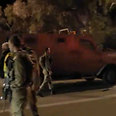
Lone soldier syndrome
Analysis: Next Lebanese soldier to 'go crazy' will not be seen by Israel as 'random incident'
About 10 days ago, an explosive device was planted in the Golan Heights in an attempt to target an IDF jeep. The Syrian intelligence, which is interested in signaling to Israel that it must stop contact with the rebels in the Golan Heights, was likely behind this move. The involvement of messengers of the Syrian establishment in such an event could point to a change of policy in Damascus.
Israel, on its part, did not respond openly, mainly because it took a while for Israel to realize that it was a standard military explosive charge and not a stray shell. Behind the scenes, however, a direct message was relayed to Syrian President Assad, which included an explicit threat and description of what would happen in the region should such an incident repeat itself.
Sunday evening's tragic incident in the Rosh Hanikra area is not a change in policy, but a syndrome of the lone soldier who killed an IDF soldier of his own accord. Both the Lebanese army and the Lebanese government were alarmed by the incident and were also the first to report it to Israel. The message they relayed was plain and clear: A soldier belonging to the Sunni faction left the Lebanese post in Rosh Hanikra, advanced several hundred meters towards the border fence and fired of his own accord at a random target.
On Monday that soldier was already captured, and has been interrogated since then. In the afternoon hours, during a meeting of the Israeli-Lebanese military committee in Naqoura, Israel was handed a report describing the affair, from which it appears that the Lebanese are making every effort to renounce the soldier and his actions.
Warning for the future
So the public declaration made by Defense Minister Moshe Ya'alon,that the Lebanese government and army are responsible for the murder, is in fact a warning for the future rather than a declaration of intent for the present. Israel's defense establishment has reached the conclusion that this event does not reflect any substantial change in the proceedings along the Lebanon border, neither on the part of the Lebanese army nor on the part of Hezbollah, and estimates are that these two armed forces are pursuing their efforts to maintain calm in the region.
The IDF inquiry should be directed inwards: What is the movement policy of IDF forces along the border fence in the dark? And why was it so urgent to carry out that technical mission at night, using a soldier travelling on his own along the barrier? There must have been an unusual reason for this urgency.
Near the place where Shlomi Cohen was killed, citizens move on the northern road, in broad daylight, and if the Lebanese soldier was looking for an Israeli target he could have hit them too. Hence the defense minister's public warning: The next Lebanese soldier to "go crazy" will no longer be a "random incident," and Israel will have no other choice but to force the Lebanese army to make an effort to look after its people.










